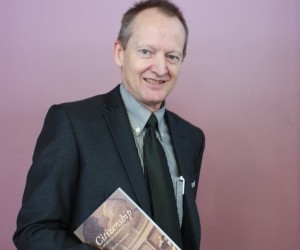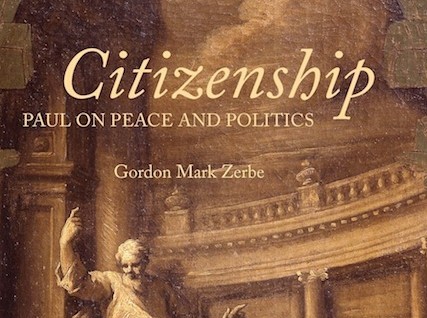 January 31, 2013 – CMU PRESS is pleased to announce the publication of Citizenship: Paul on Peace and Politics, by Gordon Zerbe. Citizenship is a collection of essays that offers “a revisiting of Paul’s theological vision and practical activism around the theme of citizenship.”
January 31, 2013 – CMU PRESS is pleased to announce the publication of Citizenship: Paul on Peace and Politics, by Gordon Zerbe. Citizenship is a collection of essays that offers “a revisiting of Paul’s theological vision and practical activism around the theme of citizenship.”
Gordon Zerbe is Professor of New Testament at Canadian Mennonite University (CMU), Winnipeg, Manitoba. He is the author of Non-Retaliation in Early Jewish and New Testament Texts, as well as numerous articles in books and journals. Zerbe recently contributed two essays in The Colonized Apostle: Paul through Postcolonial Eyes (edited by Christopher Stanley; Fortress Press, 2011): “The Politics of Paul: His Supposed Social Conservatism and the Impact of Postcolonial Readings;” and “Constructions of Paul in Filipino Theology of Struggle.”
Mark Reasoner, author of Romans in Full Circle: A History of Interpretation, describes this book as “a wonderful introduction to social and political issues in the Pauline corpus, making a significant contribution in Pauline studies and in political theology.”
Neil Elliott, author of The Arrogance of Nations: Reading Romans in the Shadow of Empire, describes these essays as “exegetically judicious and boldly creative,” and adds that “by organizing these essays around aspects of ‘citizenship,’ Zerbe provides the most nuanced and compelling description we have yet seen of the political dimensions of the apostle’s thought and praxis.”
The chapters in the book are organized according to the citizenship themes of loyalty, mutuality, and security. Essays in the first section, “loyalty,” draw attention to the fundamental personal and corporate dynamics of citizenship in the context of Paul’s ecclesial politics. The second section, “mutuality,” is centred mainly on the internal features of the Messianic assembly as a citizen community, including its approach to social diversity and economic disparity. The third section, “security,” includes essays that investigate the questions of violence, peace, and warfare in and pertaining to Paul’s writings. A last section, “affinities,” engages Paul’s perspective with broader conversation partners beyond the fields of biblical and theological studies.
Zerbe attributes his most significant inspiration for the interpretation of Paul to four years of learning and teaching in the Philippines, as visiting professor at Silliman University Divinity School, Dumaguete City (1996-98, 2002-04). Born and raised in Japan, Zerbe continues to take an interest in inter-cultural engagement, having completed an MA in Cultural Anthropology from Western Washington University (1987).
Professor Gordon Zerbe holds a PhD in New Testament from Princeton Theological Seminary (1991) and has taught at CMU since 1990.
CMU PRESSis an academic publisher of scholarly, reference, and general interest books at Canadian Mennonite University. Books from CMU Press address and inform interests and issues vital to the university, its constituency, and society. Areas of specialization include Mennonite studies and works that are church-oriented or theologically engaged. Visit www.cmupress.ca
For more information about Citizenship: Paul on Peace and Politics, or to request a review copy, contact:
Paul Friesen at cmupress@cmu.ca or 1-204-885-2565 ext. 659.
Citizenship: Paul on Peace and Politics is available from theCMU Bookstore, locatedat 500 Shaftesbury Blvd., Winnipeg.
Contact cmubookstore@cmu.ca; telephone 204.487.3300.
The book can also be ordered online at cmupress.ca
Citizenship:
Paul on Peace and Politics
Gordon Mark Zerbe
CMU Press, 2012 | xii + 276 pages, paper | $26.00
ISBN 978-0-920718-93-3
An Excerpt from the Introduction
From Citizenship: Paul on Peace and Politics (CMU PRESS)
While the specific language of citizenship may not be frequent in Paul’s writings, I am increasingly finding it to be a vital framework for understanding Paul’s apostolic letters, and for reflecting on the contemporary implications of his legacy. Indeed, whereas discipleship (or “following,” German “Nachfolge”) has been the core watchword in my own Anabaptist-Mennonite tradition, I find that word easily susceptible to an individualist interpretation or practice. The notion of citizenship, however, not only conjures up the crucial element of personal loyalty and practice, but also that of a social and global-ecological vision, formation, and identity (even if an identity that confounds prior identities, or undermines the very notion of identity)—that is, altogether, a politics.
In the usage of this volume, politics does not refer narrowly to the business of governing or to relating to a government. Rather, it is used in its more general sense as being and forming a polity, a citizen-community, participating in a social formation, whether as a particular community, or in relation to a society (and its ruling, political structures) or the global neighbourhood more generally. The Jewish historian Josephus (ca. 37-100), a near contemporary of Paul and similarly both a Pharisee and a dual citizen of Judea and Rome, is the first writer to use the Greek term “theocracy” (theokratia), as a way to describe the distinctive polity of Israel-Judea, relative to other political formations (e.g., kingship, democracy, oligarchy). This notion involves the basic concept of all of life under the rule of God, and roughly a synonym of “the kingdom of God.”
As with Josephus, the kind of personal and global vision that motived Paul cannot be subsumed under the constricted category of what we think of as “religion,” having to do with what is specifically spiritual or narrowly supernatural, or that which pertains to matters of personal, private encounter in relation to the divine, as somehow sequestered from other arenas of living and interacting. Instead, the horizon of both Josephus and Paul is much better described as “theo-political,” and in Paul’s case, the particular polity under construction could be called a “christo-cracy”—a specifically Messianic political formation, something that would have made the elite, high-priestly Josephus uncomfortable. Granted, in both Josephus and Paul, the “ruling power” (kratia, whence “-cracy”) of God is mediated: for Josephus, it was properly mediated through high-priestly oligarchs (and thus represents what the Greeks called “aristocracy,” the “rule of the best, most worthy”); for Paul, it is mediated directly through Messiah, although that direct rule also requires a kind of interim, provisional mediation (a flexible leadership structure gifted through the Spirit, and otherwise anarchic), insofar as it is socio-political formation, as Christ’s very body, yet to be fully realized. While Josephus and Paul may have agreed in principle on the notion of “theocracy,” their visions diverge dramatically. Paul’s Messianic politics is a world-transforming (not world-ending) vision of politics from below, from the margins, from the inside, or as he also puts it “from above” (“from heaven,” Phil 3:20; “from Zion,” Rom 11:26)—a radical future impinging on the present (1 Cor 7:29-31; 10:11). It is oriented to the “Jerusalem above,” God’s “free city,” the “mother” city (Gal 5:26) of a domain that will one day reunite the entire world (1 Cor 15:24-28; Col 1:15-20). The sacerdotal, high-priestly politics of Josephus is much more a politics as usual, not needing to embrace the radically disruptive. Still, the common Christian slogan—that the Jews longed for a purely political Messiah, whereas Christ was a merely spiritual Messiah—is actually wrong on both sides of the comparison.
Endorsements
Citizenship provides a wonderful introduction to social and political issues in the Pauline corpus, making a significant contribution in Pauline studies and in political theology. In ways at once accessible and profound, Zerbe articulates pressing questions and meta-questions in the ongoing quest to read Paul’s letters in light of their contexts and message for the church.
Mark Reasoner, Associate Professor of Theology, Marian University, author of Romans in Full Circle: A History of Interpretation
These exegetically judicious and boldly creative essays spring from Zerbe’s sustained reflection, over a number of years, on the challenge that contemporary national claims on our allegiance pose to the higher claims of baptismal commitment. By organizing these essays around aspects of “citizenship,” Zerbe provides the most nuanced and compelling description we have yet seen of the political dimensions of the apostle’s thought and praxis. This welcome volume deserves the close attention of every interpreter of Paul. The Arrogance of Nations: Reading Romans in the Shadow of Empire
Neil Elliott, adjunct instructor, Metropolitan State University and United Theological Seminary, author of The Arrogance of Nations: Reading Romans in the Shadow of Empire
With scholarly rigor and keen insight, Zerbe has captured a striking angle on Paul’s vision of the new messianic community of Jesus, too often overlooked or minimized in Pauline studies. Citizenship identifies Paul’s multi-faceted plea to adopt only one pledge of allegiance in the world of competing powers and politics: God’s Messiah-Jesus. Inquiring readers will find this exposition of “loyalty,” “mutuality,” “security,” and “affinity” in Paul’s writings richly rewarding.Jesus and Paul before Christianity
V. George Shillington, Professor Emeritus of Biblical and Theological Studies, Canadian Mennonite University, author of Jesus and Paul before Christianity
In this stimulating volume Zerbe has brought together the fruit of a long scholarly engagement with Paul. Fully conversant with contemporary scholarship, both within and outside the church, Zerbe explores Paul’s thought with a clear and sharp eye, looking for what “citizenship” looks like for members of “Messiah’s global politics.” He succeeds brilliantly in “un-domesticating” Paul, only to reintroduce the prophetic envoy of the Messiah to those struggling to be loyal to Jesus within a world of power and violence.
Thomas Yoder Neufeld, Professor of Religious Studies and Theological Studies, Conrad Grebel University College, author of Killing Enmity: Violence and the New Testament

